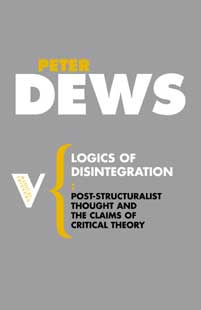If there is one phrase guaranteed to provoke fits of rage in people of otherwise sound mind and judgement, it is the phrase “French post-structuralism”. And yet it has never been exactly clear why this is the case. Certainly, given some of the positions to which post-structuralism has laid claim, it was never likely to meet with universal approval. But equally, for all their principled hostility, it has sometimes seemed questionable whether the many opponents of post-structuralism are really all that familiar with what, precisely, these claims are. Indeed, often it seems all that a pitched prosecution can summon, when pressed, are emotive accusations of nihilistic relativism, combined with supplementary charges of basic insincerity – the vapidity of this contention often standing in inverse proportion to the venom with which it is offered.
 This book, first published in 1987, and now reissued as part of Verso’s Radical Thinkers II series, serves as a valuable corrective to this kind of loose talk. An extensive scholarly study, it collects seven of Peter Dews’ polemical essays on post-structuralism. As a convinced adherent of the Frankfurt school of critical theory, Dews has no time for the more typical, lazy and jaundiced reception that post-structuralism has received in the Anglo-Saxon academic world. As he coolly notes in his introduction, “one often has the impression that such criticism ultimately relies on a moral approach, leaving the central contentions of post-structuralism, which are powerful and complex, untackled and undefeated on their own terrain.”
This book, first published in 1987, and now reissued as part of Verso’s Radical Thinkers II series, serves as a valuable corrective to this kind of loose talk. An extensive scholarly study, it collects seven of Peter Dews’ polemical essays on post-structuralism. As a convinced adherent of the Frankfurt school of critical theory, Dews has no time for the more typical, lazy and jaundiced reception that post-structuralism has received in the Anglo-Saxon academic world. As he coolly notes in his introduction, “one often has the impression that such criticism ultimately relies on a moral approach, leaving the central contentions of post-structuralism, which are powerful and complex, untackled and undefeated on their own terrain.”
Recognizing that “it is not sufficient to point to the ultimate passivity, or even the politically disastrous implications of a mode of thought which prides itself precisely on a reckless integrity and consistency,” Dews proceeds instead by working steadily and successively through the different oeuvres of four out of five of the leading post-structuralist luminaries – Jacques Derrida, Jacques Lacan, Jean-François Lyotard, and Michel Foucault, with Gilles Deleuze the notable absentee – in order to show that, “for all its posture of radicality, post-structuralist thought is itself bound to certain vulnerable assumptions.”
According to Dews, the fatal philosophical fault of post-structuralism is its failure to preserve the proper dialectical distinction between the subject and the object. As he understands it, Derrida dissolves this distinction into a metaphysics (the dirtiest word in contemporary philosophy) of language, Lyotard into a metaphysics of desire and Foucault into a metaphysics of power (Lacan escapes relatively unscathed).
Overall, Logics of Disintegration constitutes a resolute effort. A few moments of madness aside, Dews remains essentially judicious throughout it, and while he is not the wittiest writer in the world, his prose is perfectly serviceable.
However for all his technical competence a deeper problem remains. Make no mistake, for all of its general interest, this is a deeply academic book, and this raises a question since, whatever else post-structuralism was, it was never exactly an academic movement, rather laying claim, in the tradition of French thought, to a much more extensive social role and far wider scope of interest. The post-structuralist fellow traveller Roland Barthes, for instance, gleefully analysing the cultural meaning of steak and chips and the semiotics of wrestling in his book Mythologies, clearly could not comfortably be placed in the grand academic tradition of austerely investigating the transcendental structure of being. To a certain extent this point seems to escape Dews.
Indeed, it is as if, post-structuralism having sought to take philosophy out of the academy so as to inscribe it into everyday life, Dews now proposes to shove it back inside. This point relates more broadly to Verso’s Radical Thinkers series in general.
Although clearly following in the marketing footsteps of trailblazing New York publisher Semiotext(e)’s cheap and stylish Foreign Agents (the elegant series of little black books which effectively introduced post-structuralism to America), conceptually the gulf between the two couldn’t be wider.
Foreign Agents presented itself, on the level of both style and content, as a para-academic or, indeed, even anti-academic operation, derisive towards what it referred to as “second-hand work” – “No introduction or commentary (academics always eat their food pre-digested) but original texts and interviews, getting ideas from the horse’s mouth,” as Sylvére Lotringer, Semiotext(e) founder and chief editor, once put it dryly. Radical Thinkers, on the other hand, has been composed of a series of scholarly, extremely dense, almost exclusively reissued texts, written either by dead men or established “brand name” academic stars, and so far featuring not one single woman. How radical is this? And indeed how radical does it even really want to be?
Faced with the choice between actively seeking to continue the old post-structuralist project and working to expand the reach of philosophy into the everyday, and merely making a vague nostalgic niche market mark on a moment now past, Verso sadly seem to have gone for this second option, when they could be going out and finding the theorists of the future. ■
Logics of Disintegration is published by Verso

